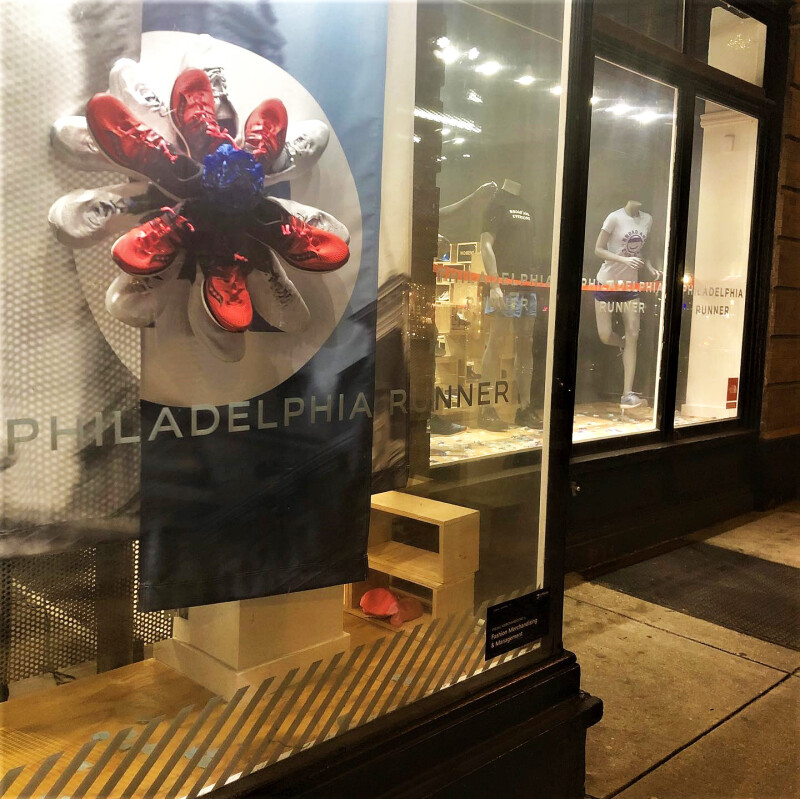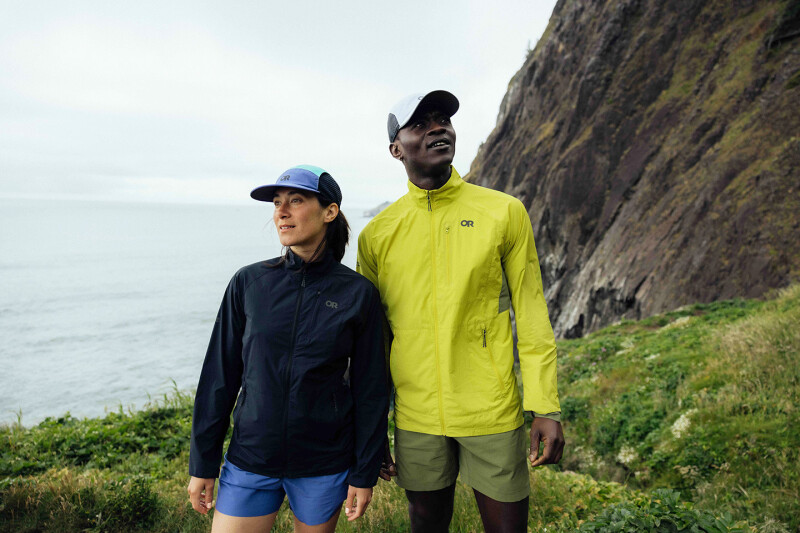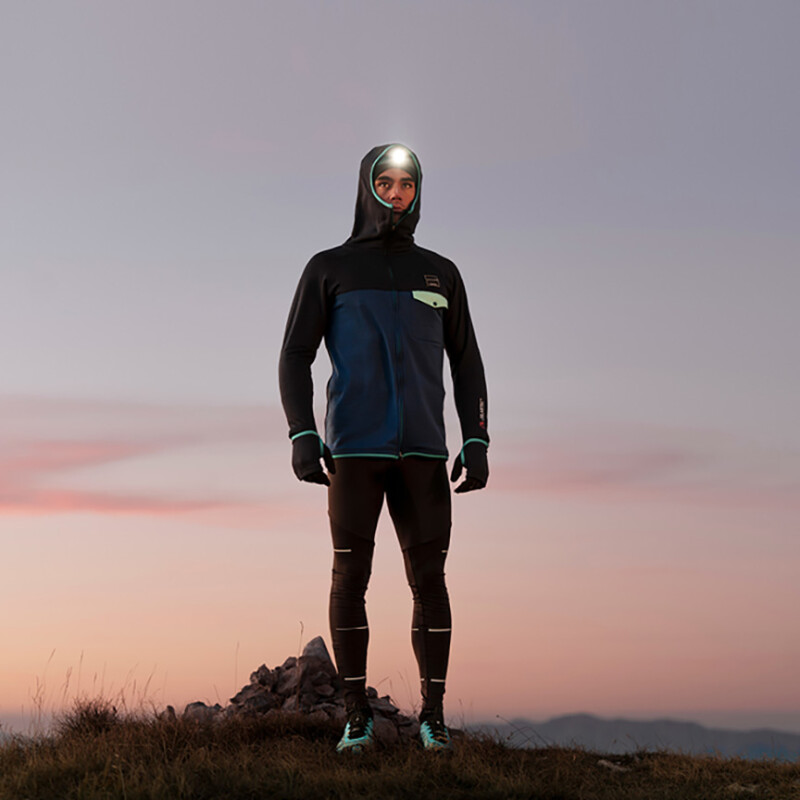In one of its final big steps before the COVID-19 pandemic derailed daily life in March 2020, Philadelphia Runner welcomed a group of visual merchandising students from Thomas Jefferson University into its Manayunk store.
In a joint project between the class and the Manayunk Development Corporation, the students assigned to Philadelphia Runner interviewed store leadership about their business and how they looked to utilize their windows. Thereafter, the students assumed control of the store’s Main Street-facing window. With an earnest creative energy and a modest budget, the group produced an artistic, eye-catching display of recycled shoes painted red and white and laid out to resemble a blooming flower.
“It was a cool, artistic window that took a lift off of our shoulders,” Philadelphia Runner outreach and marketing director Liz Pagonis recalls.
Over the years, Philadelphia Runner has worked with undergraduate and graduate students representing classes and clubs from some of Philadelphia’s many institutions of higher learning, including Drexel, Penn, Temple and Jefferson. Such collaboration, Pagonis says, brings Philadelphia Runner to a new audience and sets fresh eyes on the 17-year-old business.
“These students are on the forefront, giving us a sense of trends and, in particular, what young people are thinking,” Pagonis says.
Leveraging New Ideas, Talents
Among the nation’s run shops, Philadelphia Runner isn’t alone in leveraging the minds and labor of college students to provide interesting ideas, if not tangible results.
A few years back, a graduate business student from Eastern Michigan University approached Ann Arbor Running Company (AARC) owner Nick Stanko about working with the store on a human resources-oriented class project. Though a rather open-ended inquiry, Stanko knew exactly where the student could help.
For years, Stanko had been piecing together an employee handbook on a Google Doc, pulling ideas from other retail shops and incorporating different things he wanted his team members to know into one central, albeit hastily arranged, document. The graduate student interviewed ownership and employees, tidied up Stanko’s rather informal notes, added important HR rules and organized the document into a clean and detailed employee handbook that AARC now issues to all staff.
“He got a grade and we got an employee handbook for free,” Stanko says. “It was a win-win.”
Intriguing Ideas
In Nebraska’s capital city, the Lincoln Running Company (LRC) opened its doors to students from an advertising class at nearby Nebraska Wesleyan University this past spring. After evaluating the store’s current advertising efforts and interviewing LRC leadership, the student group compiled a complete creative brief and presentation highlighting different ways the 45-year-old running store could better utilize social media to reach new customers and bolster brand awareness.
The students’ work, in fact, compelled LRC management to dedicate one of its full-time staff members to oversee the store’s Instagram presence while it also sparked discussions among leadership about using video to spotlight new products as well as LRC’s key points of differentiation.
“Whenever we’ve done projects like this, there’s a lot that we can run around our minds,” LRC manager Ann Ringlein says.
Though not every idea is usable, Ringlein reminds.
In a past project with journalism/advertising students from the University of Nebraska’s flagship campus in Lincoln, undergraduates presented LRC a series of out-of-the-box ideas the store might use to court the university’s 20,000 students. One idea was creating a “flash dash” in which a 100-meter race would break out on campus in one dramatic, unexpected swoop to create curiosity and interest.
“It was a fun idea, but not something we could realistically do,” Ringlein says.
A Fresh Perspective
Years ago, Stanko remembers a class from the University of Michigan’s Ross School of Business sharing a business evaluation of AARC, specifically identifying what the run specialty operation was missing and where it could improve. The group pushed AARC to develop an e-commerce presence, if not for direct sales than certainly as a pre-shopping tool to let customers browse the shops’ vast assortment of goods.
“I knew we wanted to be online and needed to be online, but we didn’t have the resources at the time to do it on our end,” Stanko says.
Still, the students’ work made Stanko that much more determined to launch an online store. AARC unveiled a rather comprehensive online store in 2019 and Stanko credits that strong e-commerce presence with saving AARC from disaster when COVID-19 forced the closure of its two shops in early 2020.
“Now, e-commerce is something we invest in daily,” Stanko says.
AARC has continued to work with undergraduates from Michigan’s business school, including groups that have performed business evaluations of AARC’s multi-store operation.
“These groups have looked at what we’re missing and what we might improve, and that perspective can be really helpful,” Stanko says.
That same open-mindedness exists at Philadelphia Runner. Students from Temple University’s Fox School of Business and Management recently conducted a social media innovation project focused on how Philadelphia Runner might engage more people on social media and better tie their brand and social media presence to e-commerce services.
The group’s final report included a content audit and competitive analysis as well as a creative brief that featured sample posts.
Specifically, the students urged Philadelphia Runner to revive the #BroadandEveryone campaign to promote the popular Broad Street Run and to highlight the running store’s local flair; to more strategically incorporate e-commerce; to post more user-generated content; to partner with micro-influencers to expand its brand; and to create interactive social media content spotlighting merchandise.
“On the inside, we know our thoughts and goals, but the students give us a different perspective that can be really informative and insightful,” Pagonis says.
NEW PERSPECTIVES
Potential College Collaborations
With nearly 4000 colleges and universities in the U.S., there is vast opportunity – provided, of course, colleges and universities are sincere and willing partners – for run shops to collaborate with higher ed to collect fresh ideas, leverage research interests and create opportunities for the run shop and its customers. Such collaborations might include:
- A design class creating new logo options for the run shop, its races or store programs.
- A contest for original designs of branded product that capture the running store’s brand and sense of place.
- An advertising class or club creating a social media plan or marketing strategy for the business.
- Physical therapy or exercise science students doing research work with your run club or exposing customers to such opportunities. (The Running Center in Tampa Bay recently shared news of a paid research opportunity with the University of South Florida to investigate the impact of a commercially available product on performance and muscle soreness.)
- An operations or logistics class evaluating e-commerce and fulfillment operations.
- A summer internship for a student in marketing/advertising or merchandising.
- Future physical education teachers creating the framework for a youth running program.
- A merchandising class offering window ideas or evaluating store layout.







